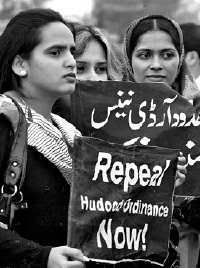 Women Protection Bill, 2006 (“WPB”) has finally passed, in an overwhelming majority vote, by the Pakistani Senate. MMA in a last attempt to make WPB ineffective suggested 17 amendments, which were all rejected by the Senators. Having already been cleared by the National Assembly, the only thing left, procedurally, for the bill to become law of the land is Presidential consent.
Women Protection Bill, 2006 (“WPB”) has finally passed, in an overwhelming majority vote, by the Pakistani Senate. MMA in a last attempt to make WPB ineffective suggested 17 amendments, which were all rejected by the Senators. Having already been cleared by the National Assembly, the only thing left, procedurally, for the bill to become law of the land is Presidential consent.
WPB is the first step towards changing the draconian rape and adultery laws, which were implemented by the President Zia-ul-Haq. The present Musharraf government has fought very hard to get these changes through and to make these amendments possible. This is not to suggest that these amendments are in anyway adequate or enough, however, they are the first step. WPB has been severely compromised by the pressure from MMA. They were some changes suggested by them, which have been incorporated in the Bil (text of changes available courtesy of eteraz.org). However, the entire text of the Bill still remains unavailable; therefore, it is very difficult to comment on the same with any certainty.
Ali Eteraz does offer some analysis on WPB and the issues with the same:
“Rape is now tried under the secular penal code, and the Sharia courts do not have jurisdiction over rape/rape-allegations.
This means that rape does not have to be proven by four witnesses (it can now be proven by circumstantial, even DNA evidence). The part on rape is the biggest victory of this bill. Rape has been totally separated from adultery or any other crimes of chastity.
Non-rape extra-and-pre-marital sex acts are still tried by the Sharia courts.
However, “lewdness” (a new offense which includes both adultery and pre-marital sex) will be tried by the secular courts.Yes, that means that two different court systems will have power over adultery and pre-marital sex: adultery/fornication matrix for Shariah courts; lewdness matrix for secular courts.
Those two courts systems will fight over it, and I have no idea how they determine who gets to try them. That is actually the million dollar question. My lawyer friend suggests that it is a judge which determines the jurisdiction. Question is: is that a Sharia judge or a secular judge?�
 The analysis further suggests that the matter would fall within the jurisdiction of Shariah court because of the Article 203D and 203DD (which describes the power of Shariah Court). This may not be necessarily true, and these questions of procedural and interpretation of law would only become clear with the passage of time and development of case law under the amended law.
The analysis further suggests that the matter would fall within the jurisdiction of Shariah court because of the Article 203D and 203DD (which describes the power of Shariah Court). This may not be necessarily true, and these questions of procedural and interpretation of law would only become clear with the passage of time and development of case law under the amended law.
However, it needs to be noted that most of the analysis is based on hearsay and is based on assertions and presumptions from other sources. Nonetheless, the analysis offered does deal with some of the legal and constitutional issues that may/will arise in respect of WPB. The limited text, which is available on Eteraz and the commentary in the newspapers all suggests that even at its best WPB, is extremely vague and there are various ambiguities and loopholes in the same. Any detailed and concrete analysis of legal issues would have to wait until the availability of the draft legislation.
 Nevertheless, it would not be wrong to say that the Presidential consent would not be the end of WPB both politically and legally. Politically there is the dilemma of threat by MMA of resigning from the National Assembly. Legally there are issues of constitutional law as well as procedural law attached with this legislation. In context of legal issues, this matter will only be conclusively decided either by the decision of the Supreme Court of Pakistan or by further amendments to the legislation.
Nevertheless, it would not be wrong to say that the Presidential consent would not be the end of WPB both politically and legally. Politically there is the dilemma of threat by MMA of resigning from the National Assembly. Legally there are issues of constitutional law as well as procedural law attached with this legislation. In context of legal issues, this matter will only be conclusively decided either by the decision of the Supreme Court of Pakistan or by further amendments to the legislation.
Umera Ali is a lawyer and blogs at Pointless Conundrum.



















































Adnan,
I didn’t know Truth is so bitter for you.
Remember Two Wrongs never make a Right.
[quote post=”437″]In PAKISTAN the majority is muslim but this new bill has given some rights to the women that ISLAM do not allow. H[/quote]
My friend don’t hate Islam for your own limitations. Be fair please?
I think this converted muslim lady BBC member is infinite times better than born ignorant muslims who were never blessed to read Koran in their life.
[quote post=”437″]Feel free to present facts. Fatwas don’t prove anything.[/quote]
was that not you who once claimed to know everything about Islam and u wasted lots of bandwidth and space to prove your points? whya re you depending on others?
mariam, what have u done against US patriot bill which allow to spy your home and phone calls? I would consider u respectable and credible if you first raise voice against the injustice happening in your surrounding.
[quote comment=”16515″]Mr. Shoaib Akram, are you suggesting that Islam is against women’s rights? It is not. I think you just insulted both Islam and women.[/quote]
Feel free to present facts. Fatwas don’t prove anything.
I am not much of a religious person but my position on the Hudood bill is such:It doesn’t matter how noble the intent of the law was/is. The only application of Hudood bill in Pakistan has been to misuse it to oppress women. It has been used as a tool by the powerful to serve their own agendas. There is no indication that things will change in the near future. So why not take this tool away from these elements when it doesn’t serve any other purpose?
Does anyone seriously believe that the passage of the bill has made Pakistan into a more moral society? Would someone stand up and say that their mothers, who grew up on the pre-Zia era, had looser morals than their sisters?